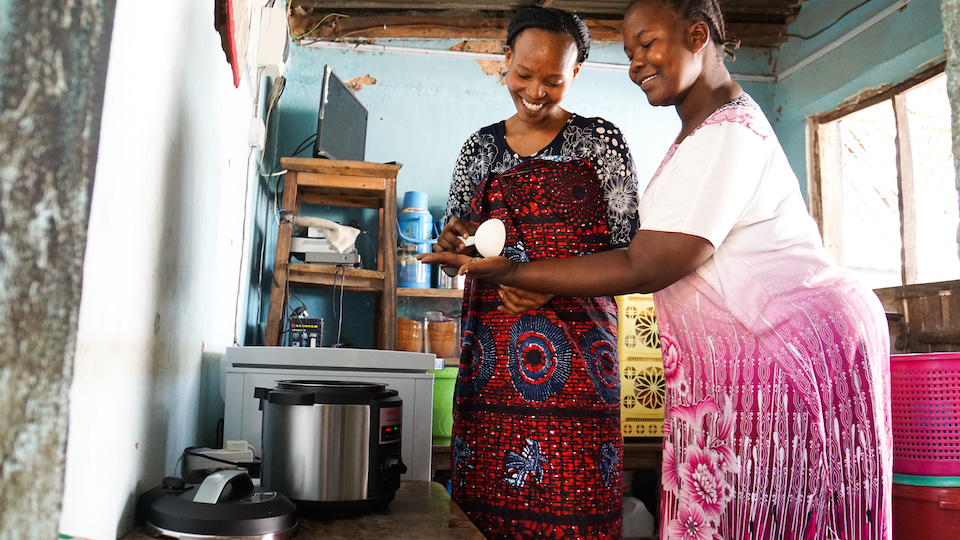Socially just energy systems

Current policies and practices are not delivering enough progress on SDG7, as evidenced by the current rates of access to clean cooking and electricity.
More socially inclusive, development needs-focussed policymaking, planning and service delivery are needed so that everyone can benefit from a sustainable energy transition - including the poorest and most vulnerable groups.
Our work includes policy and technical research on socially just energy systems and solutions, capacity building, and deploying on-the-ground solutions.
Modern Energy Cooking Services (MECS)
The FCDO-funded Modern Energy Cooking Services (MECS) programme, led by Professor Ed Brown, is a £40 million programme working across 19 countries. In just three years, MECS has become a leading global centre for innovative research and action on new clean cooking approaches. The programme is driving global interest in clean electricity for cooking, which could be a game-changer for accelerating progress on universal access to clean cooking.
MECS brings together researchers focusing on global market and political economy analyses, national and local energy planning, and support for technical, regulatory and financial innovation. It also delivers in-country work with local communities, entrepreneurs and consumers, and has recently developed a multi-dimensional framework to assess and monitor gender equality, equity, and women’s empowerment in modern energy cooking services.
Energy Delivery Models (EDM)
Further efforts to scale up progress on SDG7 includes inclusive financing through social protection approaches, know as energy safety nets, to ensure that the poorest and most vulnerable groups have access to energy. It also involves developing more inclusive, needs-based and cross-sectoral planning approaches to design and deliver energy services in different country contexts.
This includes a capacity building programme using the innovative Energy Delivery Models (EDM) planning approach developed by Dr Sarah Wykes in collaboration with researchers from the International Institute for Environment and Development (IIED) and partners in Southern countries. EDM is the key methodology for a major three-year capacity building initiative to support national and sub-national energy planning in Kenya, via the EU-funded Sustainable Technical Energy Assistance (SETA) programme.
Our researchers have extensive experience at the intersection of transdisciplinary academic research, development practice and business. They have been pivotal in the development of the UK Low Carbon Energy for Development Network (LCEDN), which promotes transdisciplinary research and collaboration on low carbon transitions in the Global South.
We also contribute to shaping enabling policies and knowledge exchange through our membership of the Alliance of CSOs for Clean Energy Access (ACCESS), a global network of energy access practitioners and researchers.
Key Publications:
- Batchelor, S, Brown, E, Scott, N, Leary, J (2019) Two Birds, One Stone—Reframing Cooking Energy Policies in Africa and Asia, Energies, 12(9), pp.1591-1591.
- Batchelor, S, Brown, E, Leary, J, Scott, N, Alsop, A, Leach, M (2018) Solar electric cooking in Africa: where will the transition happen first?, Energy Research and Social Science, pp.257-272, ISSN: 2214-6296. DOI: 10.1016/j.erss.2018.01.019.
- Zalengera, Collen; To, Long Seng; Sieff, Richard; Mohr, Alison; Eales, Aran; Cloke, Jon; et al. (2020): Decentralization: the key to accelerating access to distributed energy services in sub-Saharan Africa?. Loughborough University. Journal contribution.
- Bagley, C, Brown, E, Campbell, B, Cloke, JMP, Cameron, S, Collings, S, Gunning, R, Kabell, H, McDonnell, J, To, LS, Turner, B (2018) Mapping the UK research & innovation landscape: Energy & development
- Brown, E, Campbell, B, Cloke, J, To, LS, Turner, B, Wray, A (2017) Low carbon energy and international development: from research impact to policymaking, Contemporary Social Science, 13(1), pp.112-127, ISSN: 2158-2041. DOI: 10.1080/21582041.2017.1417627.
- Garside, B., & Wykes, S. Planning Pro-Poor Energy Services for Maximum Impact: The Energy Delivery Model Toolkit. CAFOD & IIED, 2017.
- Energy Safety Nets research series. Various country reports, research report and policy briefing.